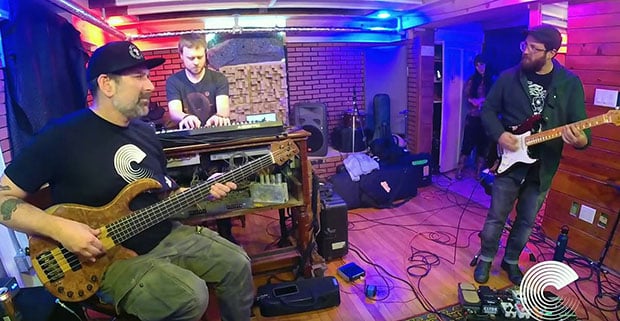
Deep in the Park Hill area of Denver, inside an unassuming brick house, is one of the city’s most up-and-coming hot spots of musical influence: Color Red.
Launched in 2018, Color Red Music is the brainchild of The New Mastersounds guitarist Eddie Roberts and his business partner Zach Bloom. Enamored by the incredibly vibrant and proactive Denver music scene and inspired to fill a void he saw, Roberts created Color Red to capture and support the music and energy emanating through his adopted hometown.
Importantly, Roberts wanted to do it in a way that supports musicians, celebrates creativity and value physical musical product in an age of digital streaming. Less than two years in, it’s clear those principles remain strong and Color Red has become a productive piece of the music community.
Roberts’ band New Mastersounds was formed around 1999 in Leeds, England. He knows about getting screwed by record labels and music business gatekeepers and has sought to create a community around the Color Red experience that is certifiably pro-band.
There are no recording fees for artists that who cut singles with the label in its studio and musicians begin receiving profits from the very first sale. Exquisitely, players (whether actively recording with Color Red or passing through on tour) are able to access an apartment owned by the label at a reduced price, a boon for musicians always pinching pennies while recording and touring. These factors have created an environment that calms nerves about all the practical white noise that comes with the business of music and allows them to focus on the art of music.
Color Red releases a single each week (digitally and on vinyl), which provides a great opportunity for fans to hear something new and unique from bands they know or would like to know. The label has been supportive of rising local Colorado groups such as Manycolors and Dragondeer and has been an outlet for Roberts work on his own projects, including the latest The New Mastersounds record and singles for his pet band W.R.D. featuring Robert Walter and Adam Deitch.
Color Red’s new releases include Brothers of Bass’ single “Legal State,” plus The New Mastersounds and Lamar Williams Jr.’s “4 Walls,” which was all recorded remotely in this time of COVID-19.
In recent weeks, the business has been a part of the relief efforts related to the global pandemic and its impact on musicians. Color Red created a “Feed The Band” program that provides a free meal to a different Denver band ever week, Tuesday through Friday, for the foreseeable future. Color Red’s Facebook has also been host to a number of live streams for artists to connect with fans and try and earn some money for their playing. As the global pandemic has created such a massive pause on the music industry, Color Red has been an integral part in such hard and trying times.
There’s a lot of uncertainty in how things will play out in the future, but you can bet Color Red will be doing its best to keep kicking out the jams and giving Denver, the nation and the rest of the world something they’ll appreciate hearing.
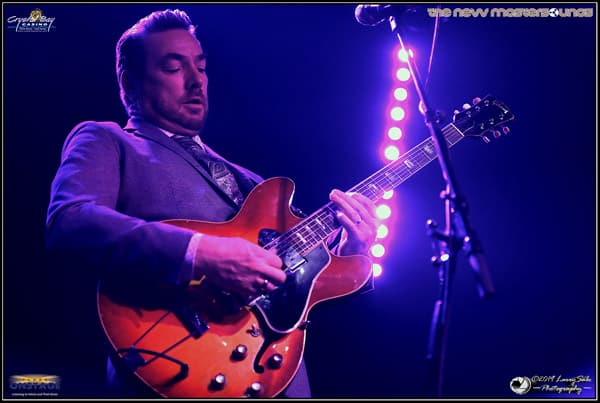
Read below for Tahoe Onstage’s interview with Color Red’s founder Eddie Roberts.
Why are artists attracted to and want to work with Color Red?
I think it’s seen as a community for artists and musicians who can release their music. It’s an empowering of the Colorado scene.
What do you think is unique about the scene in Colorado and Denver scene in particular?
I moved here five years ago and saw this hotbed of talent and amazing music being made on a daily basis. Places like Cervantes were the hub for that and I realized no one was putting this on record. Nobody was releasing anything, yet people were collaborating and flying in all the time. There was no outlet for it, nobody other than people in Colorado and Denver knew it was going on.
When I moved here, I jumped straight into the scene. A lot of other people started moving here as well and I was thinking this stuff isn’t getting archived in any way. I was involved with a record label 20 years ago. When New Mastersounds started putting out music, we put our first album out on a label — then we got ripped off — and did the second one ourselves. We’ve always released new music on our own label, based out of the U.K.. So I knew how it all worked and the infrastructure of publishing, so I knew it was doable and I knew I could do it. I knew I could produce it because I’ve been doing all the Mastersounds stuff.
What I didn’t know was how to get out on the new digital platforms that are forever changing. Then I met this guy Zach Bloom, who worked product development with TuneCore and really knew the ins and outs of the digital music scene. So we started hanging out and I was asking questions and picking his brain a little bit. Then we decided we should do something together with his knowledge of digital platforms and my knowledge and connections with musicians and producing.
What do you see what you are doing here at Color Red that you don’t see at other labels?
The way I structured it business-wise was artist-forward and artist-friendly. I’ve been ripped-off by labels, I’ve seen other people ripped-off by labels. They’ll give you 50 percent after costs and the costs are never ending. I mean, are we paying for this guy’s sandwich (laughs)? You just never know where they end and begin with these deals. We decided to set it up where artists get royalties from Dollar 1. As soon as the track is released and it’s spinning, they are making money.
The idea is if people have a good experience, they are going to come back. Why do people still go to record labels despite them getting ripped-off? Because it was the only option. But my idea is if you treat people well you’ll get loyalty from that and you’ve created a community.
Are there any moments that made you think, ‘Yes, this is why I did it.” What are you most appreciative about your role?
Interesting question. When you see success and tracks getting traction and people getting money. Also, the artists themselves feeling that they are a part of something and me feeling that from other people.
What defines a scene to you?
I think it’s proactivity. Certain members of the music community being proactive. I brought up Cervantes before. It’s not by accident there is a strong scene surrounding them. It’s because they’ve stuck their neck out and stayed independent and supported the musicians in Denver, which has an effect on the scene. Then by doing something that we are doing here, it makes people feel like they are a part of a scene and realize all the things going on and the wealth of the music that is here. It’s an empowering feeling.
Do you have any go-to moves or things you like to do onstage when you are sitting-in that you know will get a rise out of the artists you are playing with?
I always find that if I get onstage with another guitar player, I’ll go trade licks with them because you suddenly become a part of the band. The audience responds to that, the keyboard player responds to that and it could be with anyone in the band. Get the rest of the band to drop off and play with just the drummer. It starts a spark on stage and it’s definitely a good little move because you are really interacting instead of feeling like a spare part.
Have you been pushed out of your musical comfort zone lately?
(Laughs) I got on a Melvin Seals gig recently. I wasn’t paying attention, I was like, “oh yeah, Melvin Seals, he’s a B3 player.” Then two days before someone told me, “I’m surprised your sitting in with Melvin Seals and JGB. I’m like, “what’s JGB.” He’s like, “Jerry Garcia Band.” What!? (laughs). I thought we were playing blues shuffles and funky organ tunes. So I called up Melvin and he told me I’d be fine, the other guitar player in the band had his whole Jerry down. It’s not a vocabulary I’m versed in.
Another time was with some of the Leftover Salmon guys, a hootenanny at the Breckenridge Brewery. It was me and Steve Berlin from Los Lobos. I don’t think saxophone players like to play in major keys and I don’t either but bluegrass is very major (chuckles). So each time the band would start, we’d look at each other and go, “Nope,” and walk offstage. Another one, we’d go “Oh, I think we can go with this.” We literally got off and on the stage all night.
Is there a recent night in Denver where you realized this was the reason you came to this city to live and work?
The 20th anniversary show for New Mastersounds at Cervantes, which was pretty monumental for me and one of my favorite musical experiences of my life. I also had a night with W.R.D, which is Robert Walter, myself and Adam Deitch. We made an album in a day and then the next day we went and performed it and it just gelled. I was quite astonished we didn’t mess anything up. That full circle of the experience was amazing and playing in a trio setting with my kind of style is always good. It’s been good.
In a stream-heavy music economy, what kind of challenges does that present and what kind of advantages does it present for Color Red and its size and scope ?
The streaming thing is tricky and kind of tough. The most ideal situation we’ve had in recent years is the download format and with iTunes. It was 70 percent and there were no production costs. With streaming the first few years, they weren’t recording it and were essentially pirating it and certainly not paying the publishing side to the writers. Which is why the Music Modernization Act has come into play for the publishing rights. The Modernization Act has its own problems. Something crazy like 1 million streams equals $600.
I was reading something recently where it said you have to think of music now as marketing almost. But you still have to have all the sites set-up. They still sell CDs in Japan and we sell vinyl on the road and we just a distribution deal where we can get right into Tower Records Japan, just like that. The physical product is still a thing, vinyl is growing. We’ve always done vinyl pressing with New Mastersounds, I’ve always loved it. The streaming thing is rough. You have to think of it as marketing and grow around that.
Why is vinyl important to you?
I’m an old romantic, it was the way I grew up (laughs). I like the way you have to listen to music with it. One side of vinyl is 15 to 18 minutes long, then you have to get up, turn the record over, put the needle back on and you start listening from the start. When CDs first came out you could put 80 minutes on them, but you’d only listen to the first four songs before you switched off. I like the mental reset every 15 minutes that gets you back engaging with the music.
Looking a couple months out or to the end of this year, what is something you’d like to accomplish to hang your hat on?
I’d like people to be aware and keep engaging with Color Red. We’re actually working on something in Japan right now and we have a remix label in Madrid, Spain, and we’ll look to South America, too. The long vision is to have a Color Red on four continents.
-Garrett Bethmann
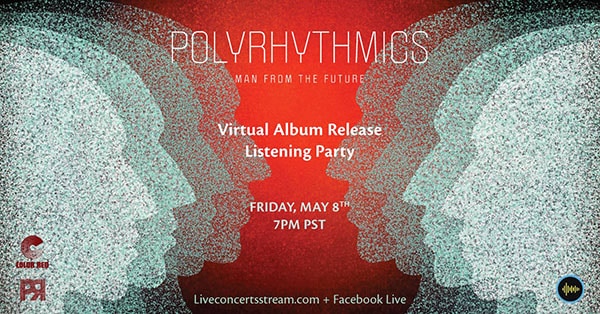
Related story: Sal’s Greenhouse cultivates “Bloom.”
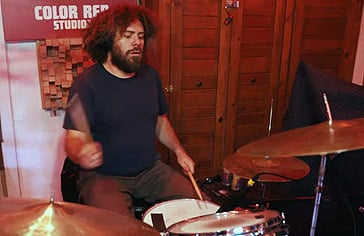
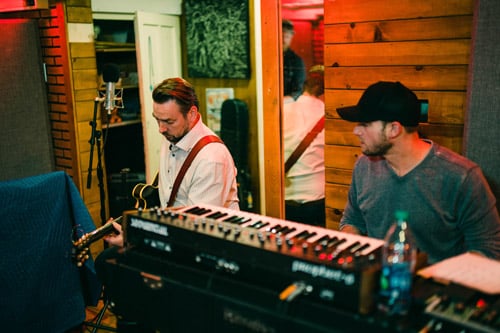
Photo by Jason Melino / Color Red
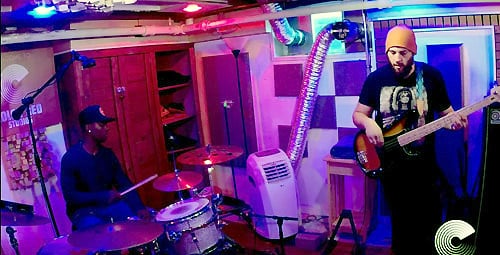
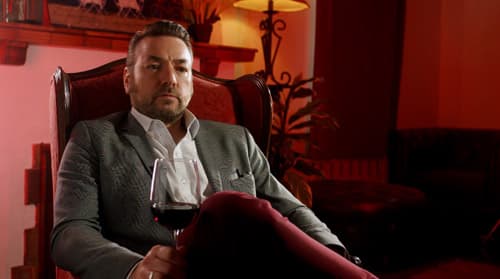
Jason Melino / Color Red

